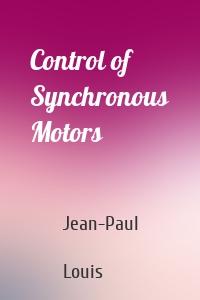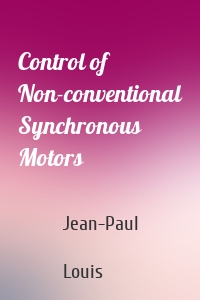Jean-Paul Louis
3 кн.
Control of Synchronous Motors
Synchronous motors are indubitably the most effective device to drive industrial production systems and robots with precision and rapidity. Their control law is thus critical for combining at the same time high productivity to reduced energy consummation. As far as possible, the control algorithms must exploit the properties of these actuators. Therefore, this work draws on well adapted models resulting from the Park’s transformation, for both the most traditional machines with sinusoidal field...
| Автор | Jean-Paul Louis |
Control of Non-conventional Synchro...
Classical synchronous motors are the most effective device to drive industrial production systems and robots with precision and rapidity. However, numerous applications require efficient controls in non-conventional situations. Firstly, this is the case with synchronous motors supplied by thyristor line-commutated inverters, or with synchronous motors with faults on one or several phases. Secondly, many drive systems use non-conventional motors such as polyphase (more than three phases)...
| Автор | Jean-Paul Louis |
Electrical Actuators
This helpful resource covers a large range of information regarding electrical actuators. In particular, robustness, a very problematic issue, is fully explored in a dedicated chapter. The text also deals with he estimate of non-measurable mechanical variables by examining the estimate of load moment, then observation of the positioning of a command without mechanical sensor. Finally, it examines the conditions needed to measure variables and real implementation of numerical algorithms. This is...
| Автор | Jean-Paul Louis |




